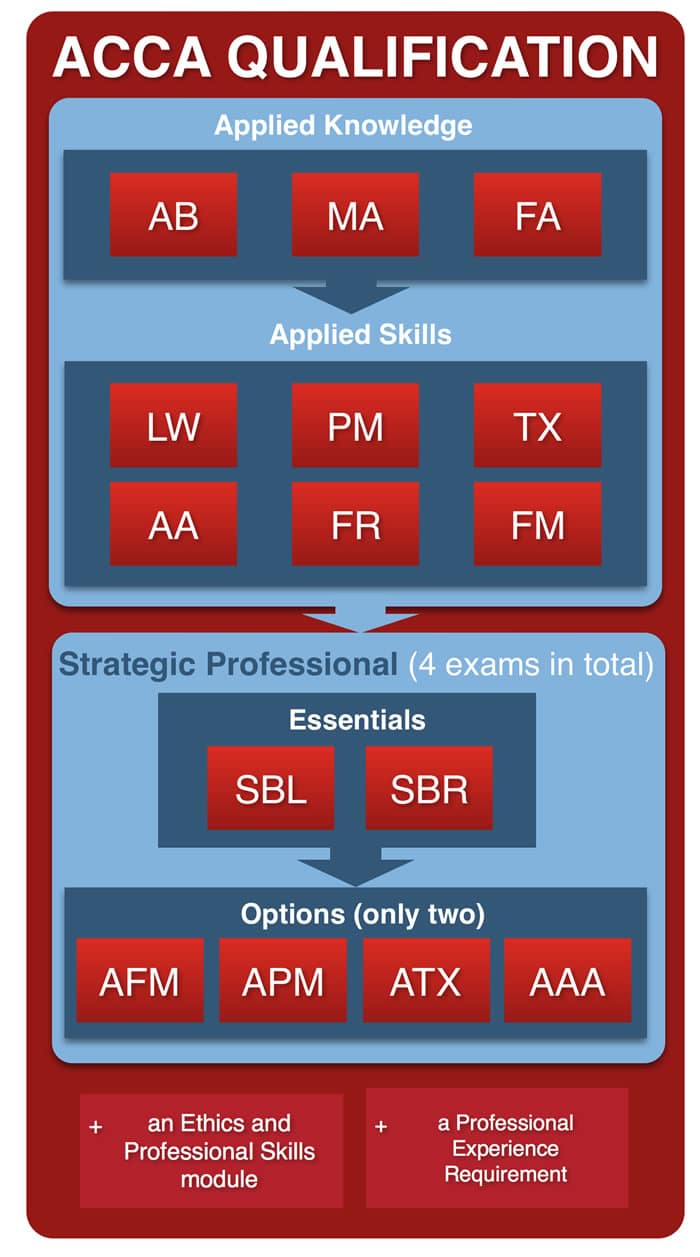ACCA, or the Association of Chartered Certified Accounts, is one of the renowned accountancy organisations in the world. The organisation has over 208,000 members and 503,000 students from 179 countries. Its membership opens the doors to a successful accountancy career and is considered a significant advantage in the fields of banking, management, and finance. Its qualification is an excellent way to pursue a career in finance and accounting. The examination scheme is comfortably stretched over two years to facilitate students to pass the exams with an achievable pass percentage set at 50%.
Importance of the qualification
- The organisation is globally recognised and has partnerships with more than 80 accountancy bodies all over the world.
- The qualification projects credibility, as the students’ proficiency is tested over 14 rigorous exams.
- It has a well-designed curriculum to cover all the critical areas and relevant subjects.
- The qualification also prepares the students to adapt to any senior management or strategic roles in the business and financial sector.
ACCA qualification levels
ACCA qualification in the UK is made of 14 subjects that are divided into the following three levels. All the modules must be attempted in chronological order.
- Fundamental level
- Professional level
- Ethics and Professional Skills module
The levels of ACCA qualification in UK have been further discussed in detail in this article.
Fundamental level
The fundamental level of the qualification is divided into two main modules covering nine subjects. The subjects in the first two modules are denoted with the initial ‘F.’
Knowledge module
The knowledge module contains three subjects and covers the main areas of financial and managerial accounting.
- F1: AB–Accountant in Business
- F2: MA–Management Accounting
- F3: FA–Financial Accounting
A student can earn a Diploma in Accounting and Business on completion of the levels F1 to F3.
Skills module
The skills module deals with six subjects which cover technical concepts that the qualified students would be expected to know.
- F4: CL–Corporate and Business Law
- F5: PM–Performance Management
- F6: TX–Taxation
- F7: FR–Financial Reporting
- F8: AA–Audit and Assurance
- F9: FM–Financial Management
A student can earn an Advanced Diploma in Accounting and Business on completing the skills module along with the knowledge module.
Professional level
The professional level also consists of two modules. Both of them are set at a higher difficulty level and are regarded as the same ability level as a Master’s degree. These modules cover more advanced skills, techniques, and concepts which are required by an accountant in an advisory or consultant role. The subjects in these modules are denoted by an initial ‘P.’
Essentials module
This module contains three compulsory levels that students must pass to progress to the next level.
- P1: GR&E–Governance, Risk and Ethics
- P2: CR–Corporate Reporting
- P3: BA–Business Analysis
Options module
The module consists of four papers, of which students need to pass only two papers.
- P4: AFM–Advanced Financial Management
- P5: APM–Advanced Performance management
- P6: ATX–Advanced Taxation
- P7: AAA–Advanced Audit and Assurance
Ethics and professional skills level
In addition to the two primary levels, students must also complete this level to gain exposure to a range of skills that are demanded by employers from the business and financial world. The online module in this level exposes students to realistic situations that develop their ethical and professional skills.
Professional experience
Apart from passing all the required levels, students also need to obtain at least three years’ relevant work experience to become an ACCA member in the UK.


